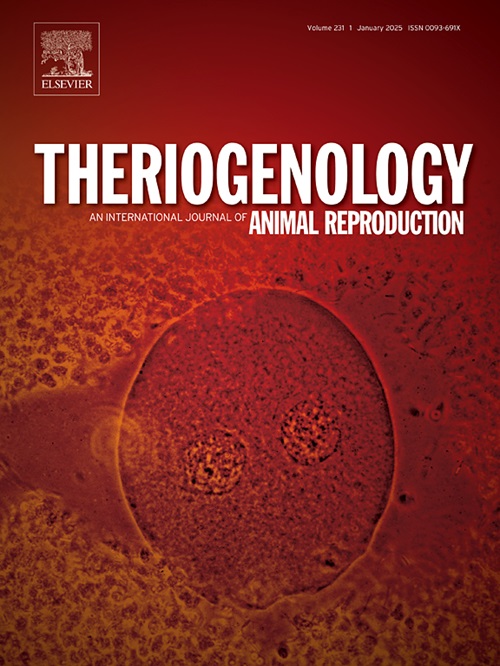间充质干细胞和精浆来源的细胞外囊泡对犬精子的冷冻保护作用
IF 2.4
2区 农林科学
Q3 REPRODUCTIVE BIOLOGY
引用次数: 0
摘要
在本研究中,考虑到狗精子冷冻保存缺乏标准化的冷冻方案,以及在冷冻保存中使用外泌体的研究有限。此外,与以往的精子冷冻保存研究不同,我们采用了一种创新的方法,使用双水相系统(ATPS)方法分离外泌体。本研究旨在评价脂肪组织源性间充质干细胞外泌体(MSC-exo)和精浆外泌体(SP-exo)在犬精子冷冻保存中的精子保护作用。6只狗的射精用tris稀释剂处理,并分为四组:MSC-exo、1.5% SP-exo、2% SP-exo、对照和冷冻。解冻后,分析精子活力、活力、膜完整性、染色质完整性、形态完整性和基因表达水平。结果显示,与其他各组相比,MSC-exo组总运动性(%60.31±6.12)、进行运动性(%22.09±3.34)、质膜完整性(%66.94±2.24)和活力(%70.88±1.95)显著提高(P <;0.05)。此外,正常染色质包装率在MSC-exo组最高(%91.33±0.61,P <;0.05)。虽然SP-exo组观察到一些改善,但它们不如MSC-exo组明显。基因表达水平无显著差异,但MSC-exo组有改善趋势。总之,MSC-exo减少了低温保存引起的精子损伤,并对精子参数提供了全面保护。这些发现表明MSC-exo可能是狗精子冷冻方案中潜在的生物添加剂。本文章由计算机程序翻译,如有差异,请以英文原文为准。
Cryoprotective effects of mesenchymal stem cell and seminal plasma-derived extracellular vesicles on canine sperm
In this study, the lack of standardized freezing protocols for sperm cryopreservation in dogs and the limited research on using exosomes in cryopreservation were considered. Additionally, unlike previous studies on sperm cryopreservation, we introduced an innovative approach using the Aqueous Two-Phase System (ATPS) method for exosome isolation. This study aimed to evaluate the sperm-protective effects of adipose tissue-derived mesenchymal stem cell exosomes (MSC-exo) and seminal plasma exosomes (SP-exo) in dog sperm cryopreservation. Ejaculates from six dogs were processed with Tris-based diluents and divided into four groups: MSC-exo, 1.5 % SP-exo, 2 % SP-exo, and control, and frozen. After thawing, sperm motility, viability, membrane integrity, chromatin integrity, morphological integrity, and gene expression levels were analyzed. The results showed that the MSC-exo group had significantly higher total motility (%60.31 ± 6.12), progressive motility (%22.09 ± 3.34), plasma membrane integrity (%66.94 ± 2.24), and viability (%70.88 ± 1.95) compared to the other groups (P < 0.05). Additionally, the normal chromatin packaging rate was highest in the MSC-exo group (%91.33 ± 0.61, P < 0.05). While some improvements were observed in the SP-exo groups, they were not as pronounced as in the MSC-exo group. No significant differences were found in gene expression levels, although an improvement trend was observed in the MSC-exo group. In conclusion, MSC-exo reduced cryopreservation-induced sperm damage and provided overall protection in sperm parameters. These findings suggest that MSC-exo could be a potential biological additive in dog sperm freezing protocols.
求助全文
通过发布文献求助,成功后即可免费获取论文全文。
去求助
来源期刊

Theriogenology
农林科学-生殖生物学
CiteScore
5.50
自引率
14.30%
发文量
387
审稿时长
72 days
期刊介绍:
Theriogenology provides an international forum for researchers, clinicians, and industry professionals in animal reproductive biology. This acclaimed journal publishes articles on a wide range of topics in reproductive and developmental biology, of domestic mammal, avian, and aquatic species as well as wild species which are the object of veterinary care in research or conservation programs.
 求助内容:
求助内容: 应助结果提醒方式:
应助结果提醒方式:


